Coconut Butter Market Summary
The global coconut butter market size was valued at $986.3 million in 2021, and is projected to reach $1.9 billion by 2031, growing at a CAGR of 7.2% from 2022 to 2031.
Key Market Trends and Insights
Region wise, Asia-Pacific generated the highest revenue in 2021.
The global coconut butter market share was dominated by the conventional segment in 2021 and is expected to maintain its dominance in the upcoming years
The online sales channel segment is expected to witness the highest growth during the forecast
Market Size & Forecast
- 2021 Market Size: USD 986.3 Million
- 2031 Projected Market Size: USD 1.9 Billion
- Compound Annual Growth Rate (CAGR) (2022-2031): 7.2%
- Asia-Pacific: Generated the highest revenue in 2021
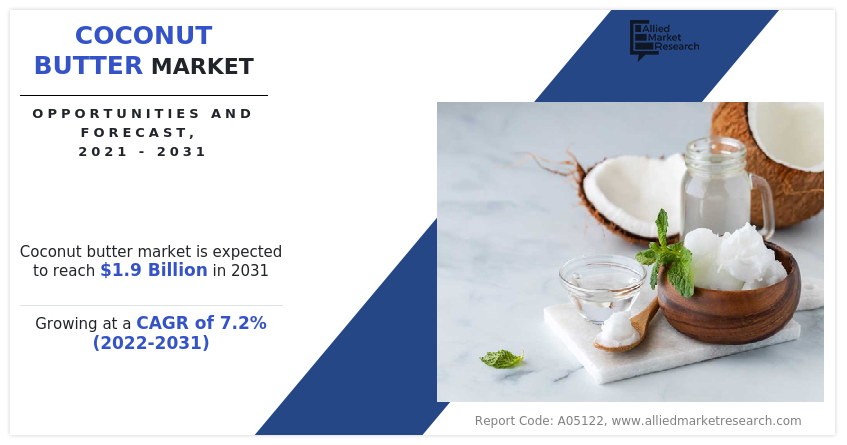
Coconut butter is made up of dried and shredded coconuts after all the water is extruded from them. It is a solid fat drawn from the flesh of the coconut and used in the manufacturing of candles, soap, and ointment. It can be stored and preserved for a longer duration at low temperatures. It is considered a healthy natural substitute for most fortified processed butter.
There are more than 50 semi-processed or processed coconut products in the international markets, however, coconut butter is gaining wide attraction among health-conscious consumers, owing to its high nutritional benefits. Being the latest trend in a breakfast meal, coconut butter is replacing conventional milk butter due to its health benefits such as maintaining good cholesterol and aiding in improved brain functions. Coconut butter has witnessed widespread adoption by millennials owing to an increase in health consciousness. It finds application in soups, curries, cakes, chocolates, and sauces as a flavoring ingredient, which further fuels the coconut butter market growth. Organic and gluten-free coconut butter is gaining increased popularity among consumers. This is attributed to the fact that organic coconut butter is high in fiber and contains lauric acid, which lowers bad cholesterol. In addition, it is used as a natural agent for the preparation of cosmetic products.
Caribbean and African countries are facing threats of lethal yellowing disease in the coconut plantation. Such diseases reduce the quality of coconuts and damage coconut plantations. This threat is posing a massive challenge for the coconut butter market.
Segment Reveiw
The coconut butter market is analyzed on the basis of nature, end user, distribution channel, and region. On the basis of nature, the market is bifurcated into organic and conventional. On the basis of end user, the market is divided into cosmetics and personal care industry, food & beverage industry, and others. On the basis of distribution channel, it is classified into supermarkets/hypermarkets, convenience stores, online sales channel, and others. On the basis of region, the market is analyzed across North America, Europe, Asia-Pacific, and LAMEA.
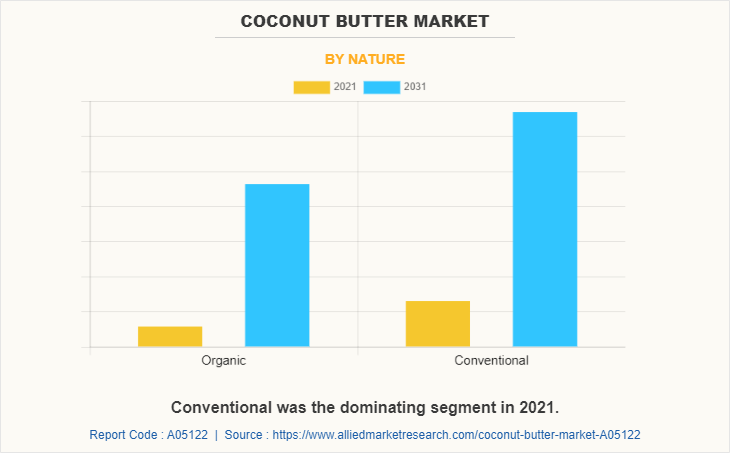
The conventional segment, as per nature, dominated the global coconut butter market in 2021 and is anticipated to maintain its dominance throughout the forecast period. Chemical insecticides and fertilizers are used on conventionally grown coconuts to promote healthy development and yield by warding off diseases and preventing pest infestations in the trees.
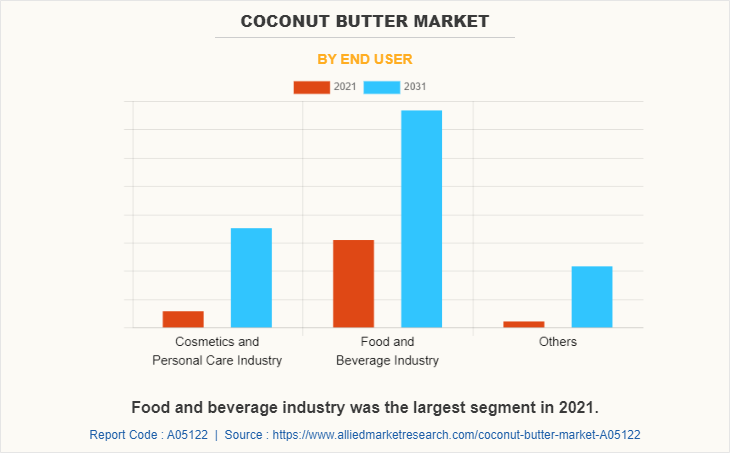
The food & beverage segment dominates the global coconut butter market. Coconut butter has grown more common in foods and beverages because of the rise in consumption of processed and manufactured foods during the past two decades. Coconut butter is widely used in both food and beverages. It is already a favorite among foodies everywhere despite being a recent addition to the market. It has been used in numerous recipes that must now be carried through the generations.
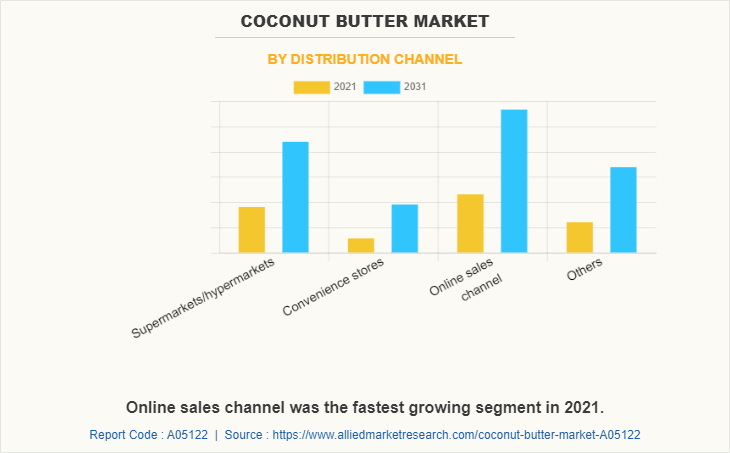
The online sales channel segment exhibits the fastest growth in the global coconut butter market. Coconut butter is frequently purchased through online platforms. This is due to the convenience of accessibility and advantages offered by the online platform, such as product quality information, time-saving features, and the capability of home delivery.
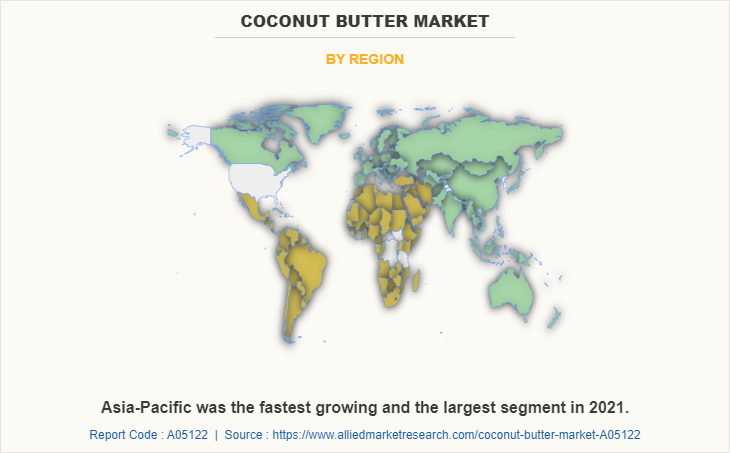
On the basis of region, Asia-Pacific dominated the market with the largest share during the coconut butter market forecast period. Since people in this region are aware of the advantages of coconut and have historically used coconut products, the market for coconut butter grows at its fastest rate. In recent years, the market for coconut butter in the Asia-Pacific region has expanded as a result of the rising acceptance of plant based diets and the growing awareness of the health advantages of coconut products.
As ordinary butter has a high LDL or bad cholesterol content, customers from North America and Europe tend to avoid it for breakfast. Instead, they prefer foods high in carbs. As a result of its entry as a new breakfast spread in North America, the coconut butter market is growing rapidly. The expansion of the market in Europe is being constrained by macroeconomic variables including the recognition of coconut butter as a low-fat product.
The market for coconut butter is anticipated to expand in tropical areas where coconuts are produced in greater quantities. The market for coconut butter is anticipated to expand in the Middle East and Africa as a result of the strong reliance of African nations on agriculture and associated products for the expansion of their economies.
Most nations experienced a lockdown after COVID-19 broke out. Although the lockdown was implemented to reduce communal transmission within the populace, it has presented a number of operational difficulties for producers of coconut derivatives. The quantity of coconuts provided was less than usual due to constrained mobility of dealers and farmers. The reduced availability of raw materials has impacted processing capacity, which has further led to an increase in pricing and a disruption in the supply chain. Growth of the market was hampered by supply chain disruption, although several positive results helped the market grow throughout the COVID-19 outbreak.
Increased consumer interest in healthy eating practices has led to a huge increase in the market for coconut butter, which continues to be in high demand due to its inherent sweetness and flavor. In addition, it helps to stabilize blood sugar levels and removes waste and toxins from the body. People take it to encourage weight loss because it is naturally high in fiber. As a result, a number of these factors are expected to support the healthy expansion of the global coconut market.
The market for coconut butter is being propelled by its expanding use as a cosmetic industry ingredient. Coconut butter offers both nutritional and physiological advantages in addition to being used as a cosmetic and a supplement in beauty care. Dermatologists have demonstrated that coconut butter offers a remedy for all the issues that women with oily hair, sunscreen, serum, and shampoos face.
There is a change in consumer preferences for dairy products from vegetable oil-based alternatives to dairy fats, globally. This trend is attributable to taste evolution and a favorable impression of health benefits of dairy fat. More dairy products are expected to be consumed in developing nations as processed food consumption rises, consumer discretionary income rises, and diets become more globally diversified. The use of coconut butter in the baking industry is greatly influenced by the increased demand for baked products such as cakes, bread, cookies, and biscuits. It is a necessary component in the production of confectioneries. The coconut butter market demand is anticipated to rise as different confectionary products become more and more popular.
The global expansion of the coconut butter market is being impacted by macroeconomic factors including the prohibition on the export of coconuts in nations like Indonesia. Such restrictions and regulations may impede the expansion of the coconut butter industry, even though many regions continue to rely on exports from tropical nations for the manufacturing of products related to coconuts. The market for coconut butter is expanding because of increase in use of the product in the personal care sector. Body creams, deodorants, and hair conditioners all use coconut butter as an ingredient. The biodegradable nature of coconut butter makes it an attractive natural alternative to chemicals in personal care products.
The market is severely affected by variations in coconut production brought on by numerous weather conditions. The rapid alteration of the climate of the earth is primarily because to the increase in greenhouse gas emissions brought on by a variety of human activities, such as deforestation and increased industrialization. Since coconuts are a perennial crop, coconut plantations are quite vulnerable to climate change. Climate change has an impact on coconut plantations due to rise in temperatures, a greater concentration of carbon dioxide in the air, changes in rainfall patterns, an increase in weeds, pests, and diseases, and an increased sensitivity to organic carbon pools. In addition, adaptations, sensitivity, and the severity of atmospheric or soil drought all have a major role in how vulnerable coconut plantations are to climate change. The production of coconuts, which are largely a rain-fed crop, is severely impacted by drought stress in practically all coconut growing locations. Every summer there are dry spells that have an impact on productivity, apart from the regular drought years. The aforementioned factors lower coconut production, which eventually limits market expansion.
Competitive Landscape
The major players analyzed for the market are ANDY ALBAO CORPORATION, Asia Botanicals Sdn. Bhd, Bali Nutra, Ceylon Coconut Company, Dhatu Organics & Naturals, Hallstar Innovations Corp., MaraNatha, Nutretiaa Industries, Phildesco Inc., and United Foods India. Key players operating in the coconut butter industry have adopted product launch, business expansion, and mergers & acquisitions as key strategies to expand their coconut butter market share, increase profitability, and remain competitive in the market.
Key Benefits For Stakeholders
- This report provides a quantitative analysis of the coconut butter market size, segments, current trends, estimations, and dynamics of the coconut butter market analysis from 2021 to 2031 to identify the prevailing coconut butter market opportunity.
- The market research is offered along with information related to key drivers, restraints, and opportunities.
- Porter's five forces analysis highlights the potency of buyers and suppliers to enable stakeholders make profit-oriented business decisions and strengthen their supplier-buyer network.
- In-depth analysis of the coconut butter market segmentation assists to determine the prevailing market opportunities.
- Major countries in each region are mapped according to their revenue contribution to the global market.
- Market player positioning facilitates benchmarking and provides a clear understanding of the present position of the market players.
- The report includes the analysis of the regional as well as global coconut butter market trends, key players, market segments, application areas, and market growth strategies.
Coconut Butter Market Report Highlights
| Aspects | Details |
| Market Size By 2031 | USD 1.9 billion |
| Growth Rate | CAGR of 7.2% |
| Forecast period | 2021 - 2031 |
| Report Pages | 250 |
| By Nature |
|
| By End User |
|
| By Distribution Channel |
|
| By Region |
|
| Key Market Players | Asia Botanicals Sdn Bhd, Andy Albao Corporation, Ceylon Coconut Company, Bali Nutra, MaraNatha, Phildesco Inc, Dhatu Organics & Naturals, United Foods India, Hallstar, Nutretiaa Industries |
Analyst Review
The perspectives of the leading CXOs in the coconut butter industry are presented in this section. The CXOs claim that coconut butter can be used in a variety of end-use industries, such as the food, beverage, personal care, and cosmetics sectors. One of the key elements that drive the market is consumer attraction to high nutritional value of coconut butter. Increased demand for coconut butter from areas like North America and Europe has resulted in an increase in the flow of exports of coconut butter from Asian nations.
The CXOs further added that the remarkable qualities of coconut butter are almost the same as those of coconut oil, if not slightly higher. However, it must be consumed in moderation, just like coconut oil. Despite being a healthy fat, it is still fat. Coconut butter can be an excellent replacement for normal butter as a method to add extra nutritional content. The benefits of coconut butter include helping with weight loss, increase in immunity, warding off infections, assisting in illness prevention, improving athletic performance, containing advantageous fiber, adding gloss to hair, and delivering iron. All these advantages provided by coconut butter drives the growth of the global coconut butter market during the forecast period.
The global coconut butter market size was valued at $986.3 million in 2021, and is projected to reach $1.9 billion by 2031
The global Coconut Butter market is projected to grow at a compound annual growth rate of 7.2% from 2022 to 2031 $1.9 billion by 2031
The major players analyzed for the coconut butter industry are ANDY ALBAO CORPORATION, Asia Botanicals Sdn. Bhd, Bali Nutra, Ceylon Coconut Company, Dhatu Organics & Naturals, Hallstar Innovations Corp., MaraNatha, Nutretiaa Industries, Phildesco Inc., and United Foods India.
Based on region, Asia-Pacific held the highest market share in terms of revenue in 2021
The rise in demand among health-conscious consumers, owing to its high nutritional benefits drive the growth of the global coconut butter market
Loading Table Of Content...



